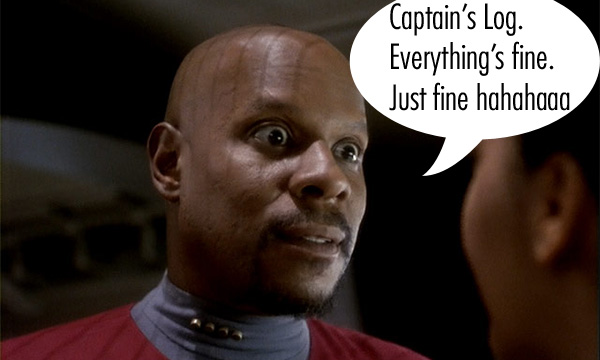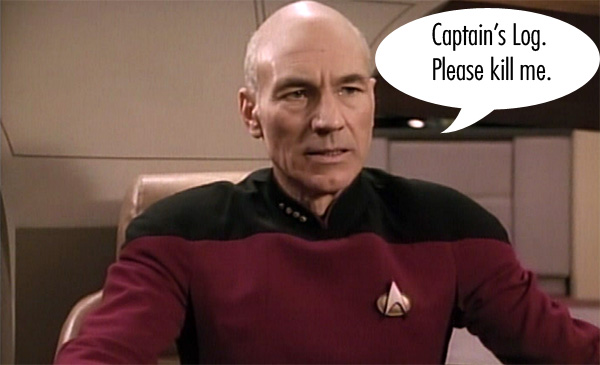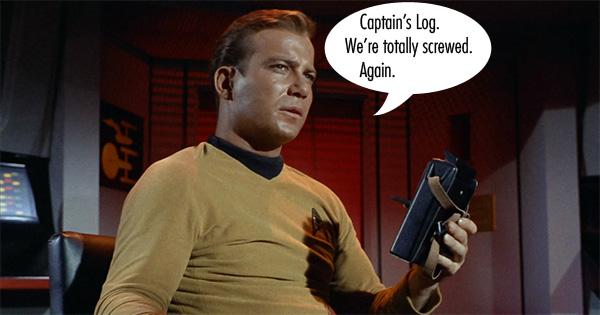
FTL: Faster Than Light is a realtime roguelike spaceship-sim that launched on Steam yesterday. Head over to the FTL Steam page to pick it up or read about our previous close-encounters with the game.
For some weeks now I’ve been the captain of a small spaceship, managing both crew and systems as it jumps from star to star in a randomised galaxy. Each arrival is a random encounter: an enemy, a ship in trouble, a wreck, or something stranger. As you hop around, you can use the scrap metal you find to upgrade your ship or buy new weapons, equipment and crew.
We’ve written dotingly about FTL before, but the new version I’ve been playing is massively expanded. Now both your crew and your enemies can be from any number of weird alien races, from vicious mantis-things to psychic slugs. You can get wrapped up in long story quests and unlock new ships to fly. And there’s now an end to the game – but I won’t spoil that here. Instead, this is the battle report of one extraordinarily tough fight, and how I got into it.
My problem in previous adventures was that I’d got good enough at not getting hit by lasers that getting hit by missiles was almost always my downfall. And there was only one good way to avoid getting hit by missiles: defence drones.
This time, I vowed, I would get defence drones. New game!
Almost immediately, I find a defence drone. This is excellent news, for reasons I hope I have thoroughly explained. But it’s no use on its own: I need to install a drone bay to launch it. You can only get those at shops, and not every sector has a shop on your route to the exit, and not every shop has a drone bay for sale.
Almost immediately, I find a shop with a drone bay for sale. This is not as excellent news as it might sound, because I’ve encountered this rare deal so early that I can’t actually afford it. Worse, I can almost afford it. This is worse because it could easily lead me to do something stupid, like sell my only missile launcher to get it.
I have sold my only missile launcher to get a drone bay. The good news is that I can now launch defence drones that make me almost completely safe from missiles. The bad news is that now, all my enemies are similarly safe from me. My main laser is decent, but if any enemy has lots of shields, I’m almost entirely impotent against it.
At the next shop, I buy a halberd beam: a devastatingly powerful laser. This is not as fortuitous as it might sound, because the halberd requires three spare bars of power to your weapon systems, and I only have one – the perfect amount for an efficient, shield-penetrating weapon like that really useful missile launcher I sold.
Pretty soon, I meet a double-shielded enemy. It’s an unmanned craft guarding a weapons cache. I already have more weapons than I can power, so I definitely shouldn’t engage it just to get that.
Long story short, I engage it, and it is difficult. My laser fires a triple burst, so if every shot hits, I can take down both his shield layers and do one point of damage to one system – pathetic. Most of the time, at least one shot misses and I do no damage at all. The only thing keeping me alive is the fact that he’s just as feeble: his nastiest weapon is a missile launcher, but I don’t know what kind because my defence drone has shot down every missile he’s fired.
Through sheer persistence I manage to whittle him down. The weapon cache he was guarding contains a pike beam – just as power hungry as the halberd and even less useful against shields. The only way this would be useful is if I find a shop to sell it at.
I don’t find a shop to sell it at. It’s getting bad. Double-shielded enemies are the norm now, and triple-shielded ones are starting to pop up. All I can do is try to survive long enough for my jumpdrive to charge and let me escape.
Eventually, all my scraping-by pays off: I’ve earned enough to upgrade my power systems to bring the halberd beam online at the same time as my burst laser.
I bring the halberd beam online.
An Engi distress call! The Engi are friendly aliens who fly weird boxy ships and are usually generous with their rewards. I jump to their location to find a weird boxy ship, bristling with guns, and full of space-mantises.
It opens fire.
It’s triple-shielded. It’s got two heavy lasers, and two heavy ion cannons. It has no missiles, so my main defence is irrelevant. OK, halberd beam, time to earn your obscene expense and power usage.
My burst laser takes 11 seconds to charge, my halberd 17. And there’s no point in firing one without the other: the best the burst laser could do is drain all three layers of their shields, dealing no damage to the ship itself. So it’s going to be a long wait.
But not for them: in scarily short order, I hear the boop of an ion blast.
I pause. A thought has just occurred. If an ion blast hits your shields, it disables the shield. Bad news if your enemy is currently charging two heavy lasers. In fact, it’s worse to lose your shields than almost any other system. But I bet the AI doesn’t know this. I bet the AI is aiming for something much less important, like our life support. So I could actually take my shields offline and let this shot go through.
To the imaginary shock and bafflement of my crew, I order them to take our shields offline. A second later, the ion blast hits... our engines. Attention all hands: lol! Also, put the shields back up now please.
Their heavy lasers hit, and my shields soak up both shots. I am doing excellent captaining. My burst laser is charged now, but like an excellent captain, I hold fire while the halberd charges. Wait for it...
Two mantises teleport into the cockpit. This is not at all what we were waiting for.
I send everyone I can spare to the large room outside the cockpit, and have my pilot Jill flee to lure the mantises there. They don’t bite. Or rather they keep biting, the cockpit.
While I’m distracted, an ion blast hits our shields, disabling them. Immediately, heavy lasers hit the medbay and the shield generator, breaking both. This is going badly. There’s a very real chance I may need to run, and that’s going to be hard with space-mantises in the cockpit. I send my weapons expert Maxim in with Jill to fight the insect problem.
I check my halberd charge: so close. Engi Matt is using his superior repair skill to get the shields back up, but we still don’t have enough for one layer. And that’s when an ion blast hits my weapons systems.
Oh hell.
An ion blast temporarily reduces power to the system it hits, which in this case takes the power-hungry halberd beam offline.
This is a disaster. It took 17 agonising seconds to charge the halberd, and now it’s back offline without ever firing. The burst laser is still ready to fire, but there’s no point. I have to wait for the ion blast to wear off, then charge up the halberd from scratch, all while being slammed with heavy lasers and ion blasts and praying nothing else hits my weapons systems and oh by the way my shields are down.
I am boned.
The mantises are twice as powerful as any human: they’ve almost killed Maxim and Jill. I send them out to the medbay, which they might as well fix while they’re there. I tag-team Aisha and Aki to tackle the foe, both with a fresh bar of health.
In the shield room, Matt is almost killed by the hammering the shields are taking as he works. My life support systems are destroyed, my engine is disabled again, and the shield generator catches fire in two different places as Matt – badly injured – tries to repair it. I can’t win, and I can’t run. Even once I get my engines back, I still haven’t taken my cockpit back from the mantises.
Miraculously, my weapons are never hit, and the halberd finally charges. I take a long, hard look at the enemy ship, figuring out where to hit.
Their shields and weapons systems are nowhere near each other, so I can’t hit both with one beam. But the real problem is how totally dead I am. Their fire is so ferocious, and when everything’s getting ionned, I just can’t keep my head above water. I can’t take any more. I have to take down their weapons.
All three burst lasers hit, taking down their shields 1-2-3. The instant the third goes down, the instant before the first comes back up, I fire the halberd. It’s precision angled to hit their weapons instantaneously, then cut through an empty room to finish on their engines.
It’s a great hit: major damage to their weapons and engines, plus about five points off their hull. It’s going to be a while before I can hit again, but I’ve taken the sting out of their tail: everything but their ions is taken offline, so as much as they can screw with me, they can’t deal real damage until they repair.
At this point, the mantises kill Aisha. Fuck.
I pull Aki out of the fight just in time, and run her to the medbay. The mantises are on their last legs, but the medbay’s only just come back online, so I have no healthy crewmembers. They chew through my helm controls, then scuttle into the drone room and start ripping that system apart too. Much of the rest of the ship is on fire. My hull is critical. Everyone’s holed up in the aft, trying to get their strength back, while the mantises gnaw freely through the front half of the ship.
My burst laser is charged, but again, I’m patient. I’m not firing until the halberd’s ready to follow through. Again, I could go for shields, but again, I just can’t risk their weapons getting in another good hit. I punch down their shields and cut the same line through the same systems, doing serious damage and keeping them weak.
It’s time: the mantises flood the shield room, where the injured Matt has just got them back online. They go for him, but he just walks out. In through the same door storm Jill, Maxim, Aki and Nathan, all at full health, and pound the shit out of them. There’s nothing left but bits.
Jill takes the helm, Matt heals up in the medbay, and Maxim gets back to his post in the weapons room.
The second he gets to the controls, my charge bars show the benefit of his expertise, and in seconds all weapons are ready to go. Finally, I go for their shields. My burst laser takes them down, then the halberd gets a direct hit on the generator, then cuts through two more rooms.
I don’t even wait for the halberd: the second my burst laser’s hot again, I target their weapons and fire. Three direct hits, all weapons offline.
The halberd is up. This is it. Maxim: go for their life support.
The beam destroys their cockpit. The beam kills their pilot. The beam takes out their oxygen. And then the beam destroys their ship.
That scene in sci-fi, where the crew all whoop and even the normally reserved captain cracks a smile – this was not like that scene. This was the scene where a captain chair-dances in his bedroom alone.

 With two sectors survived, things don’t look to good for the good ship Moggy, crewed by two Engis and a human named after cats I have known. The hull’s taken a beating, we’ve almost no cash and we don’t yet have any upgrades to speak of. Meantime, our enemies forever snap at our heels, and the challenges we’ll face in this next, Zoltan-ruled sector will likely be stiffer than that we’ve yet faced. Anything could happen, though. After all, space is big. You just won’t believe how vastly, hugely, mind- bogglingly big it is. It might even be big enough that I’ll find a gun in it somewhere. Oh, please dear lord let me find a gun.>
With two sectors survived, things don’t look to good for the good ship Moggy, crewed by two Engis and a human named after cats I have known. The hull’s taken a beating, we’ve almost no cash and we don’t yet have any upgrades to speak of. Meantime, our enemies forever snap at our heels, and the challenges we’ll face in this next, Zoltan-ruled sector will likely be stiffer than that we’ve yet faced. Anything could happen, though. After all, space is big. You just won’t believe how vastly, hugely, mind- bogglingly big it is. It might even be big enough that I’ll find a gun in it somewhere. Oh, please dear lord let me find a gun.>












